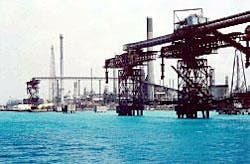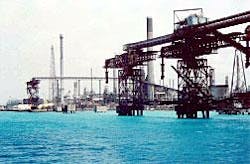Refining in paradise
While starting the data-gathering process each year for the Worldwide Refining Report, this editor often comes across unique refining situations that, while not applicable to that data-intensive report, nonetheless bear pointing out for the interest of our readers.
Worth mentioning this year is Valero Energy Corp.'s newest refining acquisition.
Nestled in the coastal region of San Nicolas on the southern part of the island, just a short stroll away from sugary sand beaches and turquoise water, lies the Aruba Refinery.
Purchased from El Paso Corp., Houston, this year by Valero, the facility currently processes 230,000 b/d of heavy, sour crude oil. Its main products are No. 2 fuel oil, diesel, and jet fuel, but no gasoline. All gasoline used on the island is imported.
The refinery's unique island location presents some interesting benefits and challenges.
null
Benefits
One major benefit of the location is logistical convenience. The island is ideally situated to import crude oil and export refined products to the US, Mexico, South America, and Europe.
Additionally, the island also has deepwater ports. "All types of vessels, including VLCCs and ULCCs, can be accommodated here. The refinery has one of the deepest ports in the world," said Martin Parrish, vice-president and general manager of the refinery.
The complex has two deepwater marine docks serving large crude carriers, six docks for refined products, and 63 storage tanks with almost 12 million bbl of storage capacity. The port's transshipment facilities can supply nonrefining services, such as freshwater reloading to passing tankers and freighters. Valero's marine department also offers offshore bunkering and lightering services.
Another advantage is the tropical marine climate. With little seasonal variation, the weather is ideal for continuous operations without requiring measures to protect equipment from extreme temperatures.
"There is no need to winterize processing units as there is in some parts of North America," said Parrish.
Although the island lies outside the Caribbean hurricane belt, earlier this month, the refinery shut down several processing units while Hurricane Ivan thundered by.
Challenges
There are also challenges to the island location, such as a lack of specialty contractors and machine shops.
In the US, the Valero refineries have the option to outsource maintenance and repair work. On the island, the Aruba refinery must keep a baseload of spare parts and equipment and man its own steel fabrication shop, the largest on the island. Emergency supplies must be shipped by air.
Also, due to its remote location, the refinery had to develop utilities to make its own hydrogen and electricity. There is no natural gas supply on the island.
The plant's employees, totaling more than 640 people, are mostly Aruban nationals with only 20 US expats.
In addition to employment, the refinery contributes to the island's population in other equally important ways.
The Aruba Way
Valero's community service program involves volunteers from the refining workforce who contribute 1-2% of their salaries and 2 hr/month of volunteer work.
The programs provide services to elderly folks, local schools, and underprivileged children and maintains 10 annual college scholarship awards. Aruba's International School lies within the refinery complex.

